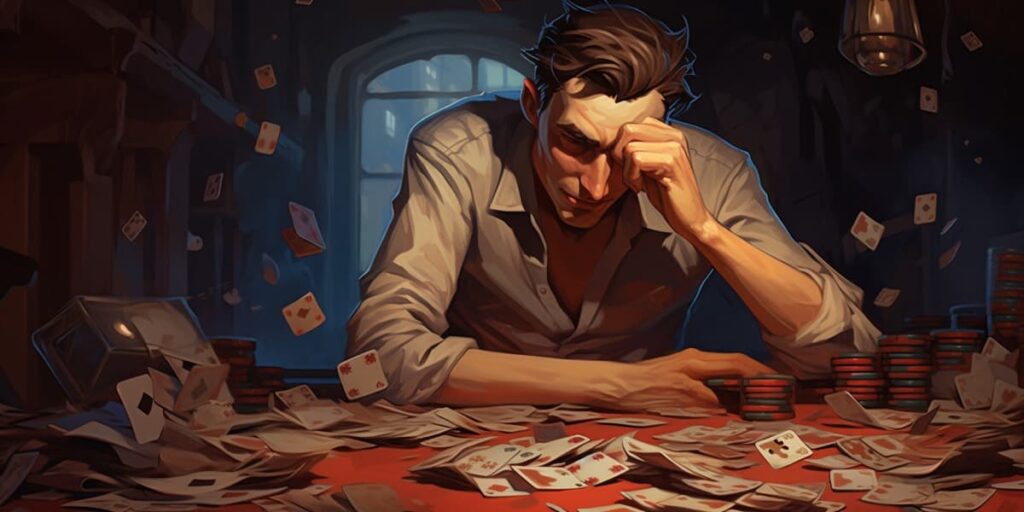I’ve been there, too – feeling as if the universe is conspiring against me. As if my every step forward is met with two steps back. You might find yourself wondering, “Why do I have such bad luck?” Well, you’re not alone in this boat.
Luck, good or bad, can often seem like a mysterious force that controls our lives. But here’s an interesting fact: there’s no scientific evidence to prove the existence of ‘luck’. Instead, much of what we perceive as ‘bad luck’ may be more about our perspective and how we respond to life’s challenges.
Let’s dive deeper into understanding why it feels like we’re plagued by bad luck. We’ll explore concepts from psychology and behavioral science that shed light on these feelings. And most importantly, I’ll share tips on how you can flip your fortunes around – because sometimes it’s more about mindset than anything else!
Understanding the Concept of Luck
Ever wonder why some people seem incredibly fortunate while others can’t catch a break? If you’re feeling like you’ve been plagued with bad luck, it’s crucial to first understand what luck really is. Is it a magical force or simply our interpretation of random events?
Firstly, let me clarify – luck isn’t an external force that operates on its own. In fact, psychologists often define luck as a way of understanding chance occurrences. It’s not something tangible that we can hold in our hands or see with our eyes. Rather, it’s a concept we use to make sense of random happenings in our lives.
Contrary to popular belief, good and bad luck do not exist in the way many people think they do. In reality, life is a series of random events – some positive and some negative. When we have more than our fair share of positive events, we believe we are “lucky”. On the other hand when negative incidents occur one after another, we feel “unlucky”.
To illustrate this point further: suppose you flip a coin 10 times and it lands heads up each time – that’s just probability at work! It doesn’t mean that the coin has “good luck”. Similarly if you lose your job or experience some other unfortunate event, it doesn’t necessarily mean you’re doomed by bad luck.
Sometimes things just happen without rhyme or reason; they’re simply part of life’s unpredictable nature. Our perception plays a big role too – for every stroke of ‘bad’ luck there might be several instances of ‘good’ fortune which go unnoticed because they’re less dramatic.
In summary: don’t fret over perceived bouts of ‘bad’ luck! Try seeing them as random occurrences instead – this shift in perspective could bring about surprising changes to your outlook on life.
The Role of Perception in Defining Luck
Let’s dig a little deeper into our topic and focus on the role perception plays when we talk about luck. It’s quite intriguing, actually how this aspect influences our beliefs about fortune or misfortune. Often times, it’s not so much about reality as it is about how we interpret or perceive certain situations.
I’ve always found that people have a tendency to magnify their bad luck while minimizing the good. We remember that one time we tripped and spilled coffee all over ourselves far more vividly than the many times we successfully navigated our morning routine. This selective memory often leads us to believe that we’re unluckier than we actually are.
It’s also worth mentioning something called ‘confirmation bias’. This is a psychological phenomenon where individuals tend to seek out information that confirms their existing beliefs. If you believe you’re unlucky, you’ll likely notice instances of bad luck more readily and disregard moments of good fortune.
Now let me share an interesting statistic with you:
| Belief in Personal Luck | Percentage |
|---|---|
| Very Unlucky | 8% |
| Mildly Unlucky | 30% |
| Neither Lucky nor Unlucky | 34% |
| Mildly Lucky | 23% |
| Very Lucky | 5% |
This data suggests that people who believe they are extremely lucky or unlucky make up only a small portion of the population. Most folks fall somewhere in between, hinting at the influence of perception over reality.
In essence, understanding your perceptions — realizing when they might be skewed or biased — can play a significant role in reshaping your experiences with ‘luck’. So next time you find yourself bemoaning your bad luck, try taking a moment to reflect on whether it’s really an unfortunate circumstance or just your perception coloring your experience.
Psychological Factors Behind Bad Luck
Ever wondered, “Why do I have such bad luck?” Well, it’s not always about the alignment of stars or some mystical forces. Often, our mind plays a significant role in shaping our experiences and outcomes. Let’s delve into some psychological factors that might be contributing to your perceived streak of misfortune.
First off, there’s something called the “Negativity Bias”. This is an inherent human tendency to give more weightage to negative experiences than positive ones. For instance, if you’ve had ten good things happen and one bad thing – guess which one you’re likely to remember most vividly? Yep! The single unpleasant event. This could make you feel like you’re constantly under a cloud of bad luck when in reality, good fortune has been knocking on your door quite often.
Next up is what psychologists call “Confirmation Bias”. This involves favoring information that confirms your existing beliefs while ignoring evidence that contradicts them. So if you believe that you’re unlucky, chances are high that you’ll focus on instances where things went awry and overlook moments when luck was on your side.
Self-fulfilling prophecies also hold considerable sway over our perceptions of luck. Essentially, this means if we persistently think we’re jinxed or destined for unfortunate events, we subconsciously behave in ways that bring about those very outcomes.
Lastly but certainly not leastly (isn’t language fun?), let’s talk about “Illusory Correlation”. It refers to the tendency to wrongly perceive a relationship between unrelated events. Say a black cat crossing your path before an interview didn’t go well – does it mean all future encounters with black cats will spell doom for your endeavors? Not really!
So as it turns out, ‘bad luck’ might just be a construct of our minds rather than an actual cosmic curse hurled at us by fate!
Scientific Explanations for Bad Luck
Ever wondered, “Why do I have such bad luck?” Well, it’s not just you. We’re humans and we tend to look for patterns in everything. Let’s unpack this a bit.
Cognitive Bias
Firstly, let’s dive into the concept of cognitive bias. It plays a big role in how we perceive luck. Cognitive biases are systematic errors in thinking that affect the decisions and judgments that people make. Sometimes these biases lead us to believe we’re having more bad luck than we actually are.
- Negativity Bias: This is an inclination to give more weight to negative experiences rather than positive ones. People with this bias feel that they experience bad luck because they remember negative events more clearly than positive ones.
- Confirmation Bias: This is a tendency to search for or interpret information in a way that confirms one’s preconceptions. If you think you’re unlucky, you’ll unconsciously be on the lookout for situations that reinforce this belief.
Randomness
Next up is randomness: life’s inevitable rollercoaster of good and bad experiences. It’s crucial to understand that occasions of ‘bad luck’ might just be random events which our brains try hard to assign meaning to.
Regression To The Mean
Then there’s regression towards the mean theory which explains how extreme events are likely followed by more normal ones – making it seem like ‘luck’ is evening out when it may actually be pure probability at play.
In short, while it can certainly feel like some mysterious force is doling out misfortune onto us, science tells us otherwise! It suggests our perception of what constitutes ‘bad luck’ might be skewed due to cognitive biases and misunderstanding of probabilities and randomness.
How Actions Influence Our Luck
I’ve often found myself wondering, “Why do I have such bad luck?” It’s a question that many of us grapple with when things don’t go our way. But here’s the thing: our actions play a significant role in shaping what we perceive as our ‘luck’. Let me explain how this works.
First off, let’s touch upon the concept of ‘self-fulfilling prophecy’. This is where our beliefs and expectations indirectly cause these outcomes to happen. If you’re constantly thinking, “I’m unlucky,” you might start making decisions or taking actions that bring about negative results – thereby reinforcing your belief about your bad luck.
For instance, imagine you’re convinced that you’ll never land a promotion because of your ‘bad luck.’ You might stop putting effort into your work or stop voicing your ideas during meetings. Naturally, these actions could lead to poor performance reviews and missed promotional opportunities – not because you’re inherently ‘unlucky,’ but because your mindset influenced your actions.
On the other hand, consider someone who believes they are lucky. They are more likely to take risks, seize opportunities, and persist despite failures. Consequently, their positive mindset propels them towards success – creating what appears as ‘good luck’.
Then there’s also the concept of confirmation bias at play here. We humans have a tendency to notice information that confirms our existing beliefs while ignoring contradicting evidence. So if you believe you’re unlucky and something goes wrong, it reinforces this idea in spite of all the moments when things went right for you.
To sum up:
- Your mindset influences your actions.
- These actions can create self-fulfilling prophecies.
- Confirmation bias can amplify feelings of good or bad luck by focusing on selective incidents.
When it comes down to it, we have more control over our perceived ‘luck’ than we may realize!
Turning ‘Bad Luck’ into Opportunity
Ever felt like you’re trapped in a never-ending cycle of bad luck? I’ve been there, and it’s not fun. But the truth is, what we often perceive as ‘bad luck’ can actually be turned into opportunities for growth and advancement.
Think about it. When things don’t go our way, it’s easy to label these instances as ‘bad luck.’ Yet, such situations often present chances for learning and self-improvement that we wouldn’t have had otherwise. For instance, being passed over for a promotion might feel like bad luck at first. But instead of wallowing in self-pity, use this setback as motivation to enhance your skills or explore other career paths.
Let me share some tips on how you can turn your so-called ‘bad luck’ into an opportunity:
- Reflection: Sometimes, we’re too quick to attribute mishaps to bad luck when it could be due to our actions or decisions. Reflecting on these instances can help identify areas where you might need improvement.
- Adaptability: Life’s unpredictable nature means things won’t always go according to plan. Being adaptable enables us to make the best out of any situation.
- Positivity: Maintaining a positive mindset can change how you perceive misfortunes. Instead of seeing them as roadblocks, view them as stepping stones towards something better.
I’m not saying it’s easy; turning bad luck around requires patience and resilience. However, by adopting these strategies, you’ll see that what was once considered ‘bad luck’ can indeed become a catalyst for personal growth and success.
Bear in mind though- feeling unlucky all the time isn’t normal; sometimes external factors are at play that require attention from professionals such as therapists or counselors. So if you find yourself constantly battling feelings of misfortune despite your efforts, don’t hesitate to seek professional help.
Remember- life’s about perspective. So, the next time you’re tempted to label something as ‘bad luck,’ take a step back and see if there’s an opportunity hidden within that misfortune. You might just be surprised at what you find.
Strategies to Improve Your ‘Luck’
Ever wondered, “why do I have such bad luck?” Well, it’s time for a shift in perspective. Often, what we perceive as ‘bad luck’ is nothing more than a series of unfortunate events that can be linked back to our actions or decisions. Let’s delve into some strategies that might help you turn the tide and improve your ‘luck’.
Firstly, you’ve got to believe in yourself. Yes, it sounds cliché but hey, it works! There’s an old saying, “Luck is what happens when preparation meets opportunity.” If you’re prepared and confident in your abilities, you’ll be ready to seize opportunities when they arise.
Next on the list – keep learning. The world is evolving fast and staying up-to-date with new information can improve your chances of success in any field. A constant thirst for knowledge not only increases your skill set but also keeps your brain sharp and alert.
Understanding the role of probability could also be beneficial. Life isn’t always fair or predictable; sometimes things just don’t go our way. That doesn’t necessarily mean you’re unlucky – it could simply be down to chance or randomness.
Adopting a positive outlook might seem like another cliché point but bear with me here. Studies have shown that people who maintain an optimistic attitude are more likely to experience good fortune than those who don’t. This doesn’t mean ignoring reality or denying problems; rather it’s about focusing on solutions and possibilities instead of dwelling on setbacks.
Finally, practice gratitude daily. By acknowledging the good things in life (even if they seem small), we cultivate an environment where positivity thrives which often leads to better outcomes overall.
Remember this: You’re not doomed by fate or cursed with bad luck; most times it’s about making conscious choices and taking calculated risks that ultimately shape our destiny.
Conclusion: Rethinking the Nature of Luck
I’ve spent this entire article exploring the concept of bad luck and why some people feel like they’re constantly under its spell. Here’s what we need to remember: it’s not about luck, but our perception of events.
Let me explain. When we label something as ‘bad luck’, we’re often attributing an external force to our circumstances. This takes away from recognizing the role our decisions, actions, or lack thereof might have played in the outcome.
Now don’t get me wrong, I’m not saying that everything is entirely within your control – life does throw curveballs at us from time to time. But if we habitually view negative occurrences as ‘bad luck’, it becomes a self-fulfilling prophecy where every unfortunate event just seemingly confirms this bias.
Instead, consider adopting a new perspective on ‘luck’. Treat each event as neutral rather than good or bad until you see how things pan out in the end. You never know — what initially seems like a setback could open doors down the line.
And above all else, remember that everyone experiences ups and downs; you’re definitely not alone in feeling like Lady Luck isn’t always on your side. So next time you catch yourself asking “Why do I have such bad luck?”, take a step back and re-evaluate your situation through different lenses.
In summary:
- Stop attributing outcomes solely to ‘luck’.
- Understand that both actions and inactions can influence results.
- View events neutrally at first.
- Remember everyone has their share of ups and downs.
By doing so, you’ll likely find that your so-called ‘bad luck’ is less pervasive than previously thought — giving way to growth, resilience, and ultimately better fortune moving forward!



